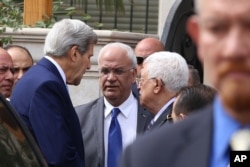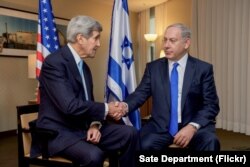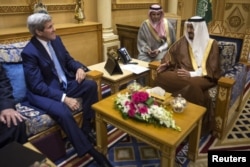Saying there is a desire to “turn the page” on a “very difficult period,” U.S. Secretary of State John Kerry on Saturday wrapped up a series of meetings with Middle East officials on the spiraling unrest between Israelis and Palestinians.
Kerry said Israel and Jordan had agreed on specific steps to help reduce the violence, including the use of video monitoring at Jerusalem’s most sacred site, known to Jews as the Temple Mount and to Muslims as Haram al-Sharif.
“This will provide comprehensive visibility and transparency,” he said. “That could really be a game-changer in discouraging anybody from disturbing the sanctity of this holy site.”
He commented during a joint appearance with Jordanian Foreign Minister Nasser Judeh in Amman before traveling to Riyadh for talks with Saudi officials.
Judeh said the issues in the Middle East were “complex,” but that the parties involved could “overcome what may be perceived as insurmountable difficulties.”
Clashes continue
The violence of the last few weeks has resulted in the deaths of at least 10 Israelis and about 50 Palestinians.
On Saturday, Israeli police killed a Palestinian man who allegedly had attempted to stab a security official at a crossing point between Israel and the Palestinian-administered West Bank
Earlier Saturday, Kerry met with Palestinian leader Mahmoud Abbas. The meeting, also in Jordan, followed a Thursday session in Vienna with Israeli Prime Minister Benjamin Netanyahu.
Kerry said Netanyahu stressed several points, including that Israel would continue to enforce a long-standing policy on religious worship that acknowledged that "it is Muslims who pray on the Temple Mount, Haram al-Sharif, and non-Muslims who visit." Devout Jews have long prayed at the Western Wall at the foot of the compound.
Kerry said the prime minister also welcomed increased coordination between Israel and Jordan. The Jerusalem holy sites are administered by a Jordanian-appointed Islamic body known as the Waqf.
In a video statement released late Saturday in Jerusalem, Netanyahu said, "Israel believes that those who visit or worship on the Temple Mount must be allowed to do so in peace, free from violence, from threats, from intimidation and from provocations. We will continue to ensure access to the Temple Mount for peaceful worshippers and visitors, while maintaining public order and security."
Netanyahu also said his government would work with the Waqf "to ensure that visitors and worshippers demonstrate restraint and respect for the sanctity of the area, and all this in accordance with the respective responsibilities of the Israeli authorities and the Jordanian Waqf."
Kerry said in Amman that further talks would be necessary to arrange details and that his special envoy for Israeli-Palestinian issues, Frank Lowenstein, would remain in Jordan for more meetings with senior officials.
Unresolved issues
While talks to quell the unrest are underway, the broader talks aimed at establishing a Palestinian state alongside Israel remain stalled. Those negotiations broke off over a year ago.
The U.S. may have a “two-pronged strategy” to encourage both sides to return to those discussions, said Ghaith al-Omari, a Middle East analyst at the Washington Institute in the U.S. capital.
“Focus on small steps but concrete steps that each side can take to show the other side that they are serious about peace,” al-Omari said.
He said the U.S. should also launch a wider regional strategy that engaged more of the Arab countries that share an interest in ending the Israel-Palestinian conflict.
Riyadh visit
In Riyadh later, Kerry and King Salman urged greater global efforts to restore stability to Syria without President Bashar al-Assad as its leader.
State Department spokesman John Kirby said the two sides "pledged to continue and intensify support to the moderate Syrian opposition while the political track is being pursued."
Kerry expressed gratitude to Salman "for Saudi Arabia's support to multilateral efforts to pursue a political transition in Syria," Kirby said.
Washington and Riyadh are part of a U.S.-led coalition that last year began an air campaign targeting Islamic State militants, who control parts of Syria and Iraq.
Kerry had met Friday in Vienna with his fellow top diplomats from Russia, Turkey and Saudi Arabia in an effort to find a solution to the Syrian conflict, but no progress was reported. Kerry said he hoped that another meeting on Syria could be held yet this month.
Some information for this report came from AFP.







